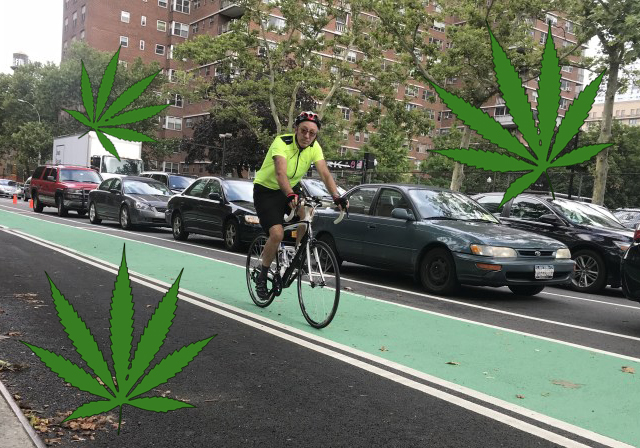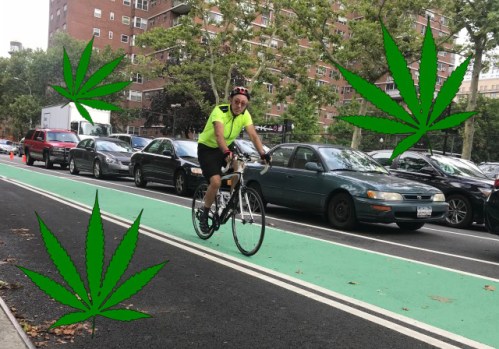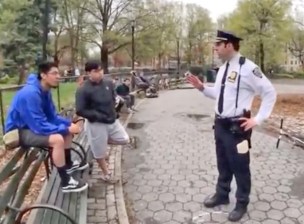It’s Illegal To Smoke A Joint And Ride Your Bike, But Not THAT Illegal



On Wednesday, New York State became the 15th state to legalize the use of recreational marijuana for adults, the end of a long campaign to fix a prohibition measure that was increasingly at odds with societal norms. Among the provisions of the new marijuana law is one that allows New Yorkers to smoke marijuana anywhere that people can smoke cigarettes, which as far as public places means anywhere but parks and beaches (which means unfortunately no getting high with the Statue of Liberty).
But what if, as someone with exceptional balance, you want to smoke a joint and ride your bike at the same time?
Well, that’s against the law, too, but it’s not as illegal as it could be.
Toking and biking is not a serious crime, thanks to New York’s lack of a specific law against drinking and cycling. Yes, if you jump on a Citi Bike after a few beers (something no one at Streetsblog would know about), you can get pulled over by a cop, but the officer could only hit you with a disorderly conduct or a reckless endangerment charge, not driving while intoxicated.
The same applies to cyclists who puff and pedal. (Or presumably if you drop acid and bicycle, as chemist Albert Hofmann famously did in 1943.)
“It’s a misdemeanor versus a felony,” said local bike attorney Daniel Flanzig.
Disorderly conduct, for instance, can get you up to 15 days in jail at worst. But a DWI can get you up to a year in jail, in addition to a six-month license suspension and a fine of up to $1,000.
However, Flanizg did caution that riding an e-bike or e-scooter intoxicated is explicitly illegal under state law, which original bill sponsor, State Sen. Jessica Ramos, confirmed also covered being high. The penalty for smoking that loud while on an e-bike or e-scooter, though not as heavy as a DUI or DWI, is up to 15 days in jail and a fine of up to $500.
Flanzig did not want to encourage smoking a joint while or directly before riding your bike, but he did put the issue into perspective, noting that the state should stay away from creating a penalty structure that mirrors the laws against operating a motor vehicle while intoxicated because of the relative damage a stoned cyclist can do.
“You could hurt yourself, but you’re not going to kill a family of four while they’re crossing the street. If you say to someone that the penalty for driving a car drunk is the same as riding a bike drunk, how do you dissuade them from not driving a car,” he said.
Fellow bike attorney Steve Vaccaro said that although the prohibition against cycling while drunk or high is real, he wasn’t familiar with anyone ever being charged under it.
“Reckless endangerment and disorderly conduct are charges only rarely used against traffic misconduct,” he said. “I’ve never heard it used against the operator of a bike or of a vehicle, based on operating while impaired.”

